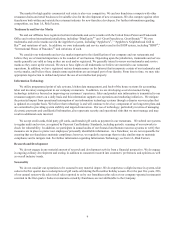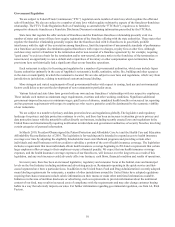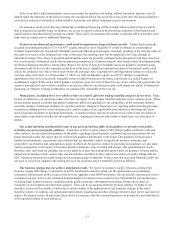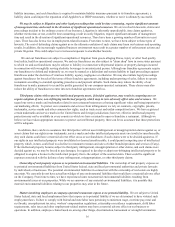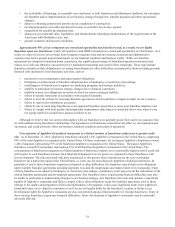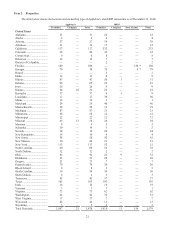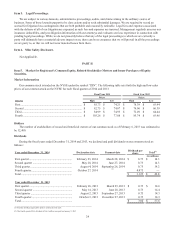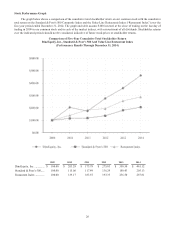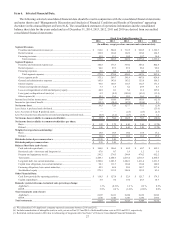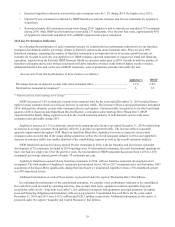IHOP 2014 Annual Report Download - page 38
Download and view the complete annual report
Please find page 38 of the 2014 IHOP annual report below. You can navigate through the pages in the report by either clicking on the pages listed below, or by using the keyword search tool below to find specific information within the annual report.19
We are subject to credit risk from our IHOP franchisees operating under our Previous Business Model, and a default by
these franchisees may negatively affect our cash flows. Of the 1,472 IHOP restaurants subject to franchise agreements as of
December 31, 2014, approximately half operate under the Previous Business Model. The Company was involved in all aspects
of the development and financing of the IHOP restaurants established prior to 2003. Under the Previous Business Model, the
Company typically identified and leased or purchased the restaurant sites, built and equipped the restaurants and then
franchised them to franchisees. In addition, IHOP typically financed as much as 80% of the franchise fee for periods ranging
from five to eight years and leased the restaurant and equipment to the franchisee over a 25-year period. Therefore, in addition
to franchise fees and royalties, the revenues received from an IHOP franchisee operating under the Previous Business Model
include, among other things, lease or sublease rents for the restaurant property building, rent under an equipment lease and
interest income from the financing arrangements for the unpaid portion of the franchise fee under the franchise notes. If any of
these IHOP franchisees were to default on their payment obligations to us, we may be unable to collect the amounts owed
under the building property lease/sublease agreement and our notes and equipment contract receivables, as well as outstanding
franchise royalties. The additional amounts owed to us by each of these IHOP franchisees subject us to greater credit risk and
defaults by IHOP franchisees operating under our Previous Business Model and may negatively affect our cash flows.
Franchisees may breach the terms of their franchise agreements in a manner that adversely affects our
brands. Franchisees are required to conform to specified product quality standards and other requirements pursuant to their
franchise agreements in order to protect our brands and to optimize restaurant performance. However, franchisees may receive
through the supply chain or produce sub-standard food or beverage products, which may adversely impact the reputation of our
brands. Franchisees may also breach the standards set forth in their respective franchise agreements.
Franchisees are subject to potential losses that are not covered by insurance that may negatively impact their ability to
make payments to us and perform other obligations under franchise agreements. Franchisees may have insufficient
insurance coverage to cover all of the potential risks associated with the ownership and operation of their restaurants. A
franchisee may have insufficient funds to cover future unanticipated increases in insurance premiums or losses that are not
covered by insurance. Certain extraordinary hazards may not be insurable and insurance may not be available (or may be
available only at prohibitively expensive rates) with respect to many other risks. Moreover, there is no assurance that any loss
incurred will not exceed the limits on the policies obtained, or that claim payments on such policies will be received on a timely
basis, or even if obtained on a timely basis, that such payments will prevent losses to such franchisee or enable timely franchise
payments. Accordingly, in cases in which a franchisee experiences increased insurance premiums or must pay claims out-of-
pocket, the franchisee may not have the funds necessary to make franchise payments to us.
An insolvency or bankruptcy proceeding involving a franchisee could prevent the collection of payments or the exercise
of rights under the related franchise agreement. An insolvency proceeding involving a franchisee could prevent us from
collecting payments or exercising any of our other rights under the related franchise agreement. In particular, the protection of
the statutory automatic stay that arises under Section 362 of the United States Bankruptcy Code upon the commencement of a
bankruptcy proceeding by or against a franchisee would prohibit us from terminating a franchise agreement previously entered
into with a franchisee. Furthermore, a franchisee that is subject to bankruptcy proceedings may reject the franchise agreement
in which case we would be limited to a general unsecured claim against the franchisee's bankruptcy estate on account of
breach-of-contract damages arising from the rejection. Payments previously made to us by a franchisee that is subject to a
bankruptcy proceeding also may be recoverable from us on behalf of the franchisee as a preferential transfer under the United
States Bankruptcy Code.
The number and quality of franchisees is subject to change over time, which may negatively affect our business. Our
Applebee's business is highly concentrated in a limited number of franchisees. We cannot guarantee the retention of any,
including the top performing, franchisees in the future, or that we will maintain the ability to attract, retain, and motivate
sufficient numbers of franchisees of the same caliber. The quality of existing franchisee operations may be diminished by
factors beyond our control, including franchisees' failure or inability to hire or retain qualified managers and other personnel.
Training of managers and other personnel may be inadequate. These and other such negative factors could reduce the
franchisee's restaurant revenues, impact payments to us under the franchise agreements and could have a material adverse effect
on us. In the case of Applebee's, these negative factors would be magnified by the limited number of existing franchisees.
If franchisees and other licensees do not observe the required quality and trademark usage standards, our brands may
suffer reputational damage, which could in turn adversely affect our business. We license our intellectual property to our
franchisees, product suppliers, manufacturers, distributors, advertisers and other third parties. The franchise agreements and
other license agreements require that each franchisee or other licensee use our intellectual property in accordance with
established or approved quality control guidelines. However, there can be no assurance that the franchisees or other licensees
will use the intellectual property assets in accordance with such guidelines. Franchisee and licensee noncompliance with the
terms and conditions of the governing franchise agreement or other license agreement may reduce the overall goodwill


